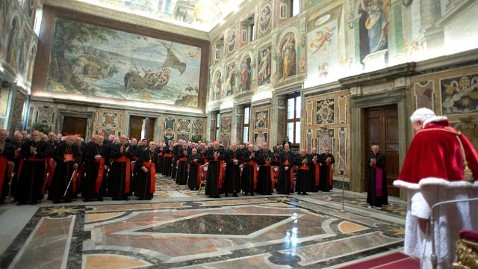A Florida man has disappeared into a 30-foot-wide, 20-foot-deep sinkhole that collapsed the bedroom portion of his home overnight, according to police.
The hole opened up at around 11 p.m. Thursday night in the Brandon, Fla., neighborhood, authorities said.
"[The family] heard a sound that they described as a car crash emanating from the bedroom in the back of the house," Hillsborough County Fire Chief Ron Rogers said at a news conference today.
The family rushed into the room where Jeff Bush, 36, was sleeping, according to ABC News' Tampa affiliate WFTS-TV.
"All they could see was part of a mattress sticking out of the hole. Essentially, the floor of the room had opened up," Rogers said. "They could hear the nephew in the hole, but they could not see him."
Bush's brother, Jeremy Bush, jumped in and tried to rescue him, but was unsuccessful. A first responder "heroically" jumped in and rescued the brother, Rogers said.
The family was evacuated from the home as rescuers tried to get to the man.
Louisiana Sinkhole Raises Fears of Expansion Watch Video
Listening devices and cameras were sent into the hole.
"They did not detect any signs of life," Rogers said. "There continued to be collapses of the earth below the floor to the point where they had to eventually back out of the house."
Rogers said the main issue right now is that authorities and rescuers do not know how stable the house is.
It was previously reported that the hole was 100-feet wide, but Bill Bracken, president of Bracken engineering, clarified at the news conference that the safety zone around the hole is 100 feet, but the hole itself is between 20 to 30 feet in diameter.
It is contained within the footprint of the house, he said.
"The hole has actually taken up most of the inside of the house," Bracken said. "It started in the bedroom and has been expanding outward and it's taking the house with it as it opens up."
When asked what authorities believe the victim's status is, Rogers said, "Until we can actually determine where the victim is, I can't really answer that. We're going to do everything we can for Mr. Bush, but we have to make sure we don't endanger other personnel in the process."
Rogers said "time is a critical thing" and they are assessing the situation as quickly as possible without jeopardizing anyone else.
"We're not going to leave until we know that this community is safe and we know the extent of this issue here," he said. We're going to make sure that everyone is safe as much as we can. We don't know where the next sinkhole is going to open."
Police evacuated the other residents from the structure, as well as the two surrounding homes. Officials say the home could go at any moment.
"Our hearts go out to the Bush family during this terrible time," he said. "They're dealing with a lot of questions, a lot of unknowns."










